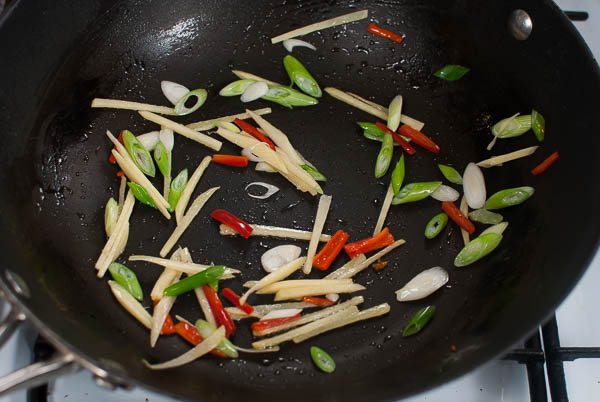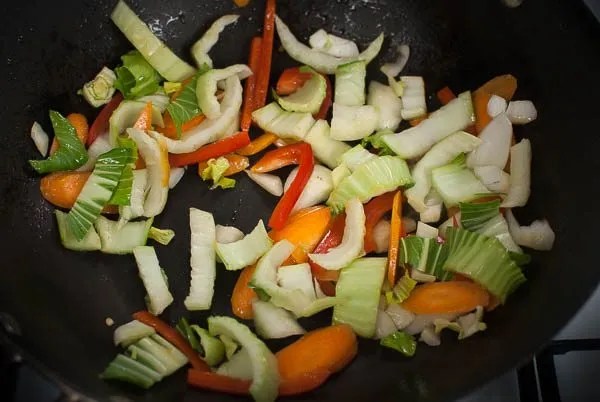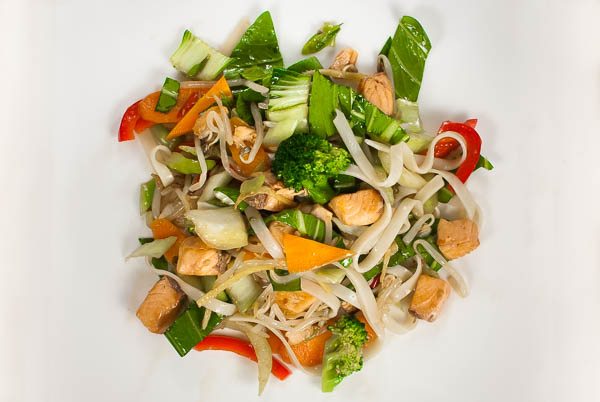1. Stir-fried salmon
If frying another piece of salmon fillet is becoming predictable and too familiar, try cutting it up and stir-frying instead. It’s quick and easy – and you’ll find yourself with a highly versatile new ingredient. Stir-frying is a good way to cook salmon – the salmon is robust enough to stay in whole pieces, it will brown in an appetizing manner and stays tender and tasty. Also stir-frying is more economic than frying single fillets as stir-fried fish can be stretched among other ingredients.
In this recipe I stir-fried the salmon as part of a warm Thai salad. You could add the stir-fried salmon to other types of warm salad, as I have in my salmon and spelt salad, or you could make an Italian tomato sauce or a creamy wine and tarragon sauce and serve it with pasta or rice.

Here are the salad ingredients: pak choi (leaves separated from the stalks), carrots, cooked refreshed and drained pad Thai rice noodles, cooked refreshed and drained bean sprouts, pepper, celery, spring onion, ginger, chilli.
A note on bean sprouts. There was a time when we ate bean sprouts raw, however, it turns out that this is no longer considered safe. This is a shame because most of the appeal of a bean sprout is its crunch – which is quickly lost when cooked. The problem lies in our inability to generate sufficient heat at home to cook them quickly. Our only options are to drop them into a commercial vat of boiling water for 10 seconds, or to take them to the local Chinese takeaway and give them a quick stir-fry over their 250,000 BTU wok burner. However, I believe I have found a domestic solution to this conundrum: the microwave cooking bag. I microwaved my sprouts for a couple of minutes and then plunged them into cold water and drained. I can vouch that the sprouts were not only well-cooked but also crunchy.

Skin the salmon – allow about 200g-250 for two people. (This piece is about 180g.)

Cut the salmon. I have cut the salmon differently for each of these three recipes. Here I am cutting into small cubes so they easily distribute through the salad.

Stir-fry the salmon. The wok must be very hot. Then add a small amount of groundnut oil. A typical gas range can only manage a measly 6,000 BTU, so don’t shake, bang and toss the wok about like they do in the takeaway – instead let it sit without moving. After it has browned and coloured on the pan-facing side, stir and toss to redistribute the pieces in the wok. Then let it sit still again to brown and colour. Repeat this process once more. They will be cooked in about 4 minutes or so. Cut one of the pieces to see if it is cooked and then drain and keep warm on a plate.

This fish is cooked perfectly. I might have drained off more fat or dried on kitchen towel – but as it will end up in a salad with an oil based dressing I have not worried. Stir-fying salmon as I shown here will keep the fish in neat pieces. The small fragments you can see are from a single piece that I broke to test for doneness.

This warm salad starts life as a stir fry. Begin with the ginger, onion and chilli.

Then add the salmon and stir to amalgamate the flavours. Set aside in a dish.

Next briefly stir-fry the pepper, carrot and pak choi stalks put into a separate dish.

Mix the dressing ingredients to taste: from top left, nam plah, groundnut oil, soy, chilli oil, lime, palm sugar. The ingredients reflect the sweet, sour, salt, hot combinations that are so characteristic of Thai cooking. NB: the palm sugar will need to dissolve into the dressing – use a small blender or mix ahead of time to allow it to dissolve. Start with a proportion of 3 parts soy, to 3 parts oil, to one part nam plah, to 1 part sugar, to 2 – 3 parts lime – finish with a couple drops of chilli oil if you like.

Finally, toss all the ingredients in a bowl with the dressing and serve.
2. Shallow-fried salmon

This method is a half-way house between stir-frying and deep-frying. The outcome makes perfect salmon nuggets for a fish taco. But the same nuggets could be served any number of ways and would be popular for young children.
Fish tacos are a famous export from Baja California in Mexico. The fish can be battered and deep-fried or grilled. My way is a bit of a cheat and uses only flour and egg – it is very effective and tasty and less oily and fatty than batter. The coating does not have the crispy crunchiness of the deep-fried salmon below, but this is fine as there is plenty of texture and taste – enough to imagine you’re on a Baja beach enjoying Mexican fish and chips!

The basic ingredients are corn or flour tortillas, cabbage for a citrus slaw, iceberg lettuce, tomatoes, avocado and creme fraiche, mayonnaise and lime for a lime mayo dressing.

Chop and slice the salad ingredients. To make the citrus slaw marinade the cabbage with a good squeeze of lime juice, a large pinch of salt and a little sugar and leave for half an hour – or longer.

The fish fillet does not need to be perfect. You can easily get four good sized tacos from this piece (about 170g).

Cut the fish into random small bits – these shapes suit the nature of tacos. They also make attractive asymmetrical ‘nuggets’ for children.

The beauty of this recipe is the simplicity of preparation. The only ingredients you need are flour and beaten egg. Dip first in the flour and then the egg.

Keep the fish in a bowl until you are ready to fry.

Fry the fish in batches in a very shallow pool of groundnut oil.

Turn when browned and brown on the other side.

Drain on kitchen towels.
Make a lime mayo dressing by mixing equal parts creme fraiche and mayonnaise and add lime to taste.

Make the tacos by heating the flour or corn tortillas in a hot pan (without oil) for a minute on each side. Fill with salad, then fish and then mayo dressing. Chillies are optional.
3. Deep-fried salmon

This time you can imagine you are on holiday in Britain eating scampi and chips!

Here is the tableau of ingredients. I use panko breadcrumbs rather than a batter. It seems neater, and less fatty. Of course deep fried nuggets need something to dip into and tartar sauce is ideal. Finally, if you can go the extra distance, chips are the perfect accompaniment.

Choose a piece of fish between 150g-200g for one person. The fish will go further when it is bread-crumbed (but then more of it is likely to be eaten!) It doesn’t need to be a perfect piece of fish as it will be cut-up and fried. Skin the fillet and cut into scampi-like shapes.

Get four bowls ready with milk, flour, beaten egg, and breadcrumbs. Dip the fish into each bowl in the order listed (you will need larger bowls than those shown in the photo). Keep one hand for wet and one for dry, otherwise you will develop growing clumps of sticky crumbs on your fingertips.

The bread-crumbed fish. These can be left quite happily in the fridge whilst getting on with the tartar sauce or chips.

Heat a large deep pan with vegetable oil and heat up to 180C. Gently slide a few fish into the batter. Do this in batches. If too many are put in at once the temperature of the oil will drop, distorting cooking time and making the nuggets greasy.

Dry the fish on kitchen towels and keep warm.

Here are the ingredients for a tartar sauce. Chopped gherkins, capers, parsley. Creme fraiche, mayonnaise and lemon. When I mixed up the contents of these dishes I found I needed about the same again of mayo and creme fraiche. Some recipes call for shallots, but I find this can make the tartar sauce harsh and difficult to digest. Adding creme fraiche makes a lighter sauce.

Serve the fish with chips and sauce.